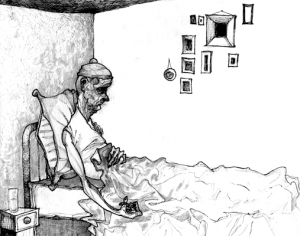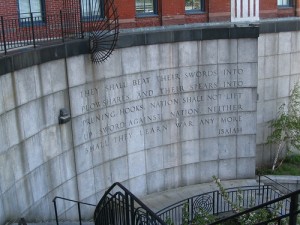From Luke’s Gospel:
Jesus said, “Be on guard so that your hearts are not weighed down with dissipation and drunkenness and the worries of this life, and that day does not catch you unexpectedly, like a trap. For it will come upon all who live on the face of the whole earth. Be alert at all times, praying that you may have the strength to escape all these things that will take place, and to stand before the Son of Man.”
(From the Daily Office Lectionary – Luke 21:34-36 (NRSV) – December 11, 2012.)
 Don’t be “weighed down by dissipation and drunkenness.” I’m told that the Greek word translated as “dissipation”, kraipale, describes the headache that results from drinking too much wine; in other words, it describes a hangover.
Don’t be “weighed down by dissipation and drunkenness.” I’m told that the Greek word translated as “dissipation”, kraipale, describes the headache that results from drinking too much wine; in other words, it describes a hangover.
When I read these words I immediately think “office party”. We don’t do those sorts of parties in the office where I currently work (I suspect very few church staffs do), but when I was a practicing trial lawyer . . . . ‘Tis the season for that sort of thing and here in the middle of it (we are about half way through Advent right now) Jesus tells us to knock it off. Negative experiences and tales of stupid and self-destructive behavior from such parties abound. That sort of thing, we know without Jesus telling us, weighs down one’s heart. But just to be sure we do understand, Jesus does warn us: drunkenness and its result and “the worries of this life” weighing down your heart, he warns, might make us miss things, like Judgment Day. Well, not miss it perhaps, but certainly be unprepared when it gets here.
I got to thinking about the opposite of a “heart weighed down” and realized that that would be “light-hearted.” According to the dictionaries, to be light-hearted is to be carefree and happy, to be known for a blithe spirit, to possess a merry blithesome nature. And I realized that this is not the currently accepted understanding of someone who self-identifies as “Christian”. A few years ago, David Kinnaman, president of the Barna research organization, published a book entitled unChristian: What a New Generation Really Thinks about Christianity… and Why It Matters (Baker:2007). In it he revealed that his organization’s findings are that modern young adults consider Christians to be judgmental, bigoted, sheltered, right-wingers, hypocritical, insincere, and uncaring. Not exactly adjectives suggesting light-heartedness.
And then last week Lutheran pastor David L. Hansen in Texas published an article about his experience listening to non-churchgoers explain why they don’t go to church: “The No. 1 thing that keeps people away from the church is the people who are in the church.” He went on to say, “It’s not that people outside the church have low expectations of Christians. It’s the opposite. They expect us to actually live out the things we proclaim on Sunday. They expect us to love our neighbor, care for the least of these and love our enemies.” (Why Don’t People Come to Church?)
Kinnaman and Hansen, I think, are simply demonstrating that we haven’t properly heard nor learned to live the message of Advent, the message of Jesus reported here by Luke. It’s really quite a simple message: “Lighten up!” Somehow, we just can’t quite seem to believe that that’s what Jesus meant, but I really think it is. Jesus wants us to be light-hearted; not weighed down by stupid and self-destructive behaviors. He wants us to be carefree and happy, and known by our blithe spirit: “I give you a new commandment, that you love one another. Just as I have loved you, you also should love one another. By this everyone will know that you are my disciples, if you have love for one another.” (John 13:34-35)
It’s Advent! Don’t let your heart be weighed down stupid and self-destructive behavior! Don’t be weighed down by drunkenness and dissipation and worry! Don’t be weighed down by judgmentalism, bigotry, prejudice, hypocrisy, insincerity, or lack of caring! Don’t be weighed down! Lighten up!
====================
A request to my readers: I’m trying to build the readership of this blog and I’d very much appreciate your help in doing so. If you find something here that is of value, please share it with others. If you are on Facebook, “like” the posts on your page so others can see them. If you are following me on Twitter, please “retweet” the notices of these meditations. If you have a blog of your own, please include mine in your links (a favor I will gladly reciprocate). Many thanks!
====================
Father Funston is the rector of St. Paul’s Episcopal Church, Medina, Ohio.


 Day before yesterday, I had a pretty good day in my ministry as rector of my parish. An Episcopal Church Women event went very well; we all had fun in what we were doing. I got home in the late afternoon and took care of a couple of personal matters, called my wife about the possibility of a “date night,” and when she said “Yes” I made reservations for dinner. I took the dog for a walk and, after my wife got home from work, we went out to dinner at our favorite local restaurant. When we returned home, I turned on my computer, checked my email, took a look at Facebook . . . and learned that Deb, a long time friend, a singer of great skill, and an occasionally very funny woman had passed away. It more than ruined the day.
Day before yesterday, I had a pretty good day in my ministry as rector of my parish. An Episcopal Church Women event went very well; we all had fun in what we were doing. I got home in the late afternoon and took care of a couple of personal matters, called my wife about the possibility of a “date night,” and when she said “Yes” I made reservations for dinner. I took the dog for a walk and, after my wife got home from work, we went out to dinner at our favorite local restaurant. When we returned home, I turned on my computer, checked my email, took a look at Facebook . . . and learned that Deb, a long time friend, a singer of great skill, and an occasionally very funny woman had passed away. It more than ruined the day.

 “When those blue snowflakes start falling, that’s when those blue memories start calling,” runs a line from Elvis Presley’s Blue Christmas. While most of us are getting ready for happy family reunions during the holidays, and clergy and liturgical ministers of all sorts are preparing for one of the year’s biggest crowds, we may forget that Christmas can be a time of great sadness for many. Mental health professionals note that the Christmas season may be one when many people avoid church. Millions of Americans suffer from the “holiday blues.” I know this all too well because December 21st is the anniversary of my mother’s death.
“When those blue snowflakes start falling, that’s when those blue memories start calling,” runs a line from Elvis Presley’s Blue Christmas. While most of us are getting ready for happy family reunions during the holidays, and clergy and liturgical ministers of all sorts are preparing for one of the year’s biggest crowds, we may forget that Christmas can be a time of great sadness for many. Mental health professionals note that the Christmas season may be one when many people avoid church. Millions of Americans suffer from the “holiday blues.” I know this all too well because December 21st is the anniversary of my mother’s death.




